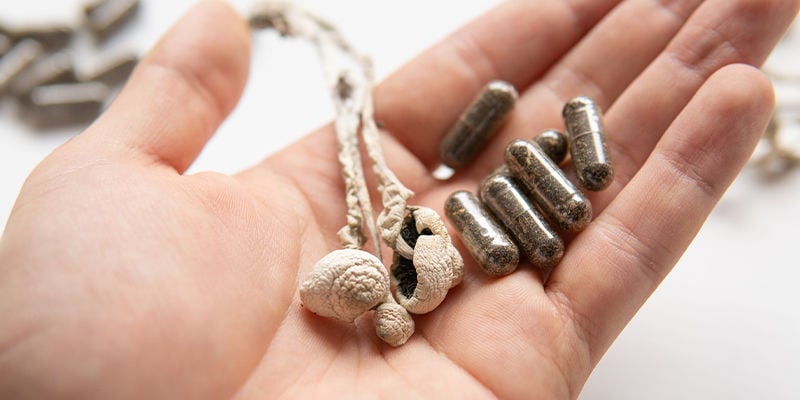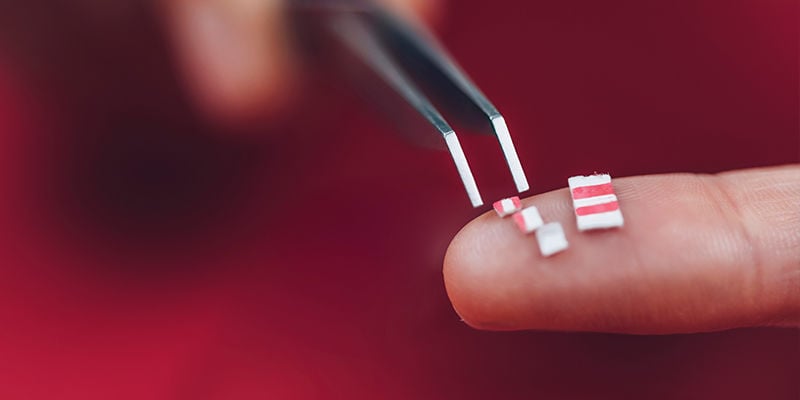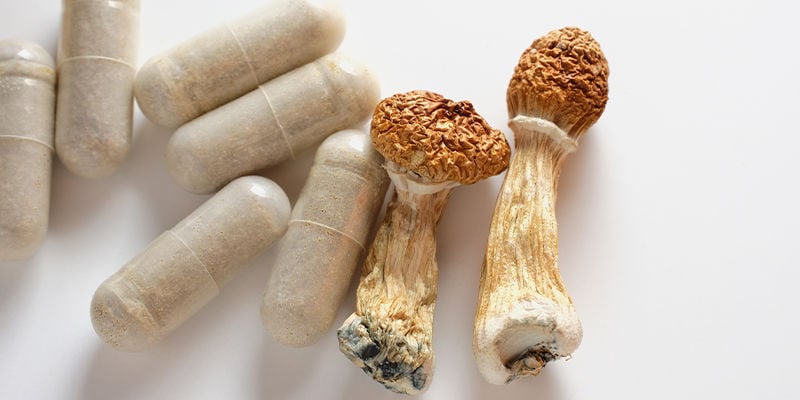
Should Psychedelics Be Considered Medicine?
Psychedelic drugs take us to incredible places, and reveal to us parts of ourselves that are often veiled. Many agree that they have healing powers, but are these their primary properties? In this article, we examine whether psychedelics should be deemed a "medicine".
Much of the world is now coming to understand that psychedelic drugs have medicinal potential. As this trend increases, these substances are entering the mainstream, and the taboo around them is being lifted.
However, should psychedelics primarily be considered medicines? In this article, I will argue that although psychedelics can be used medicinally, their potential is far greater than simply to heal, and that we diminish our conception of what these substances are, and what they can achieve, if we only think of them as medicines.
What is medicine?

The term “medicine” can refer to either a practice or set of practices, or to substances used to treat ailments. Below are two definitions.
First, medicine can refer to the practice of treating an illness or injury—as in, a doctor practises medicine. The Cambridge Dictionary defines medicine in this way as: “treatment for illness or injury, or the study of this”.
Alternatively, medicine can refer to a substance, often a drug, that is used to treat a specific illness or to aid recovery after an injury. The Cambridge Dictionary defines medicine in these terms as follows: “a substance, especially in the form of a liquid or a pill, that is a treatment for illness or injury”.
In the broadest definition, medicine can also encompass the maintenance of good health and the prevention of illness or injury, thereby avoiding the need for treatment.
Medicine requires a problem
Regardless of the definition, medicine and medicinal practice necessarily exist in relation to illness and injury—in other words, problems. Even preventative medicine attempts to maintain good health in order to avoid issues before they arrive.
Given this, medicine should only be taken or practised to cure or prevent problems. In the absence of real or potential problems, then medicine is unnecessary, and sometimes even problematic.
What are psychedelics?

Psychedelics are a category of psychotropic drugs that have a particular set of effects. The word comes from a dialogue between Aldous Huxley and Humprey Osmond, and was later coined by Osmond in a paper. Etymologically, it has two parts (derived from ancient Greek):
- psykhē: “mind”
- dēloun: “to reveal” or “to make visible”
These two words were compounded into the modern “psychedelic”, which roughly translates to “mind revealer”, implying a substance that has the ability to reveal, uncover, or make visible one’s mind.
So psychedelic drugs can be said to be any drug that is capable of giving a person unusual clarity and insight into their own internal world. Usually, this is conceived of as stripping away the ego—the part of the mind that creates delusions about the self, and that gives us our overall sense of self.
High doses of psychedelics can cause what is known as “ego death”, wherein the ego disappears entirely and a person completely loses their sense of self for a time. These can range from pleasant to deeply unpleasant experiences, but are generally regarded as profound and important events by people who have them.
Another common characteristic of psychedelic drugs is that they cause people to “trip”, which is where the visual and auditory “psychedelia” comes from. For many, it is this characteristic that most defines these drugs. Really, though, what is most unique about these substances is the insight they give people into themselves, as there are other drugs that can cause people to hallucinate, but that aren’t psychedelic.
Psychedelic drugs include:
- LSD (acid)
- Psilocybin (magic mushrooms)
- Mescaline (peyote, San Pedro cacti)
- DMT (ayahuasca)
- Salvia divinorum
- Ketamine (debatably)
- MDMA (debatably)
Are psychedelics medicine?

So, are psychedelics medicine?
Especially in contemporary conversations, the term “psychedelic medicine” is thrown around a lot, and many people refer to psychedelics as primarily, or even exclusive, a medicine.
I would say, however, that while psychedelics absolutely do have medicinal value, they shouldn’t primarily be thought of as medicine, and should instead exist in a class entirely of their own.
The following section will outline why.
The value of fun
First, fun is woefully undervalued in many modern cultures. In “The Sociology Of Fun”, Ben Fincham argues that fun is a phenomenon that holds a paradoxical position in our society (2017). Fun is usually thought of as superfluous and unserious; something associated with laziness, free time, and low productivity. Likewise, it is also understood by many that fun is one of the greatest joys, and also essential to happiness. However, it is a luxury we generally only permit ourselves once we’ve had our fair dose of hardship.
The reasons that fun is undervalued to the point of being thought of as irrelevant are manifold, and too complex to go into here. However, for the purposes of this article, let’s assume that fun is valuable in itself.
Following on from that: psychedelics are fun (mostly).
This is the first reason that psychedelics should be thought of as much more than simply medicine. They are fun. Having a psychedelic experience is exciting; it makes the world novel and special, and it gives us greater insight into ourselves.
Medicine tends not to do this. Medicine wards off issues, or helps us to recover from them. Taking medicine is not an inherently fun experience. Most of us would like not to take medicine, and only do it when we want to cure or treat something.
While psychedelics can be used in this way, many choose to use them even when they are totally healthy—not for medicinal purposes, but simply for fun.
Psychedelics offer more than healing
Following on from that, psychedelic drugs have far greater potential than simply to heal.
Medicine returns us to a state deemed “normal” and healthy. The practice of medicine aims to restore us to, or keep us at, a “normal” healthy state, or otherwise to mitigate the negative effects of a condition or illness.
Medicine is not intended to take us beyond a normal, sober state. But this is exactly what psychedelics do. And not only is it what they do, but it is why most people use them, rather than being a side effect.
A totally healthy person, who is happy and content with their life, can still both enjoy and benefit from the psychedelic experience. The same could not be said of medicines. Perhaps medicines could have a preventative value for this person, but they would not immediately improve their life.
That’s not to say that all people, healthy and happy, or otherwise, could and should use psychedelics; only that healthy and happy people stand to find some value—often great value—in them.
This links to the former point, in that even the happiest, healthiest people can still benefit from a fun, insightful, or novel experience. And this is not because these experiences offer some kind of healing, but because they add to the value of a person’s life, no matter how valuable it may already be.
Medicine seeks to return a person to baseline, to remove negativity; psychedelics can take a person above this point.
Tripping
The reason that psychedelics are fun, and the reason that they have value beyond healing, is that they cause us to trip. In this sense, tripping includes both the mind-revealing elements of the high and the perceptual changes one experiences when under the influence of these drugs.
Whether you think of tripping as a mystical experience or simply an unusual and altered brain state, few who experience it—under the right conditions—think poorly of it afterwards.
While tripping might have medicinal value, to reduce it purely to a medicinal experience, or otherwise to see it merely as a side effect of a drug that has medicinal value, is surely missing the point in a big way.
The psychedelic state is a rare and special place that only a very few substances allow us to enter, and it has deep value in itself.
Psychedelics as medicine
All that said, psychedelics may well have medicinal value too!
Studies show that psychedelic drugs have a huge potential to assist in the treatment of all manner of conditions, especially mental health conditions, including addiction.
Psychedelics for depression
The treatment of depression is one area in which psychedelics have shown the most promise. One study at the Johns Hopkins University found that the majority of participants experienced the anti-depressant effects of psilocybin even 12 months after treatment (Gukasyan, Davis and Griffiths, 2022). However, it should be noted that this trial only included 27 participants, and so is too small to generalise from. Still, in combination with other research, it appears that this trend is consistent.
As for how psychedelics might impact depression, it remains unclear. There are many potential explanations. For one, the mind-revealing effects of these drugs, especially in concert with psychotherapy, can help people to identify and break old patterns, and face issues that they usually can’t or won’t handle. On a physical level, there is still much that is unknown. One theory is that psychedelic drugs bind to the 5-hydroxytryptamine 2A receptor (5-HT2AR), and in doing so increase neural plasticity (Vargas, 2023). Neurotransmitters, such as serotonin, also bind to these receptors, but do not appear to increase neuroplasticity.
What’s special about these drugs, it seems, is that they can cross the cell membrane and get inside the neurons, rather than simply binding with receptors. Research (referenced above) suggests that when compounds crossed the cell membrane, this correlated with increased neuroplasticity.
Psychedelics for addiction
Psychedelics are also being investigated for their potential role in treating and managing addiction, or substance use disorders (SUD).
It’s not certain how they may help, but it’s suspected that the mechanisms might be similar to how they affect depression—by increasing neuroplasticity. Alongside this, it’s also thought that alterations in brain network connectivity, reward and emotion processing, social connectedness, insight, and mystical experiences are important in helping people to change their relationships with addictive substances (Rieser, Herdener and Preller, 2022).
Psychedelics: medicinal, but so much more

It’s clear that psychedelics have a role to play in medicine, and that in certain circumstances, they may be able to act as medicines. However, to view them primarily or solely as medicines would be reductive, as they offer much more than the power to heal.
Medicines treat or prevent problems and aim to restore a person to a normal level of health. Psychedelics appear to also be able to accomplish this in certain cases, but their value doesn’t end there. Rather, these drugs are able to help people rise above a normal, healthy level and have insightful and profound new experiences. In this way, they are wholly distinct from medicine, and should therefore be thought of primarily in terms of themselves, and only then also as medicine.
- MAXEMILIANO V. VARGAS. (16 Feb 2023). Psychedelics promote neuroplasticity through the activation of intracellular 5-HT2A receptors - https://www.science.org
- Natalie Gukasyan. (February 15, 2022). Efficacy and safety of psilocybin-assisted treatment for major depressive disorder: Prospective 12-month follow-up - https://journals.sagepub.com
- Rieser, Nathalie M., Herdener, Marcus, Preller, & Katrin H. (2021). Psychedelic-Assisted Therapy for Substance Use Disorders and Potential Mechanisms of Action - https://link.springer.com
-
 3 min
21 March 2023
A Conversation About Psychedelics With Professor Anil Seth
Professor Anil Seth has written numerous papers on psychedelics, the brain, and consciousness. On top of that, he has written a book, spoken at TED Talks, and works on the Dream Machine and...
3 min
21 March 2023
A Conversation About Psychedelics With Professor Anil Seth
Professor Anil Seth has written numerous papers on psychedelics, the brain, and consciousness. On top of that, he has written a book, spoken at TED Talks, and works on the Dream Machine and...
-
 5 min
1 August 2022
The 5 Most Potent Psychedelics
Find out about 5 of the strongest psychedelics around. Covering a little of the drug, and giving an overview of the effects, this list is in no way exhaustive, but should give you an idea of what...
5 min
1 August 2022
The 5 Most Potent Psychedelics
Find out about 5 of the strongest psychedelics around. Covering a little of the drug, and giving an overview of the effects, this list is in no way exhaustive, but should give you an idea of what...





 United States
United States











